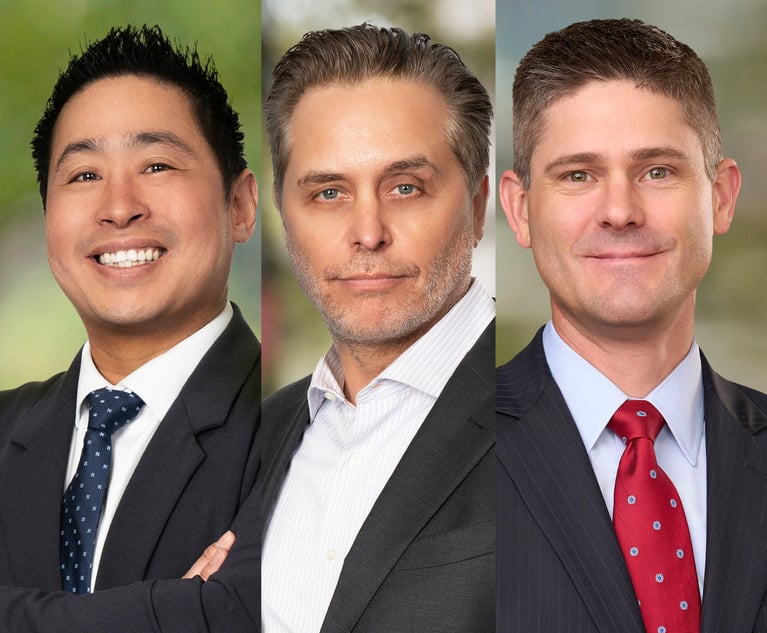Far From 'Slam Dunk,' Google Shareholder Suits Latest in Wave of #MeToo Derivative Actions
Alphabet has been hit with a pair of shareholder derivative suits claiming that board members hurt shareholder value by covering up a lengthy pattern of gender discrimination and sexual harassment perpetrated by Google executives.
January 14, 2019 at 07:32 PM
6 minute read
 Google employees participate in a walkout to protest how the tech giant handled sexual misconduct in Mountain View, California, on Nov. 1, 2018. The mass walkout was sparked by a recent New York Times report that claimed Google gave millions of dollars to some executives in secret exit packages after they were accused of sexual misconduct. Photo: Michael Short/Bloomberg
Google employees participate in a walkout to protest how the tech giant handled sexual misconduct in Mountain View, California, on Nov. 1, 2018. The mass walkout was sparked by a recent New York Times report that claimed Google gave millions of dollars to some executives in secret exit packages after they were accused of sexual misconduct. Photo: Michael Short/Bloomberg
Recent shareholder lawsuits against Google parent company Alphabet Inc. mark the latest of a new approach in tackling sexual harassment allegations in the #MeToo era.
The lawsuits, both filed in San Mateo Superior Court in California, accuse Alphabet board members of breaching their fiduciary duty by covering up a lengthy pattern of gender discrimination and sexual harassment perpetrated by Google executives. Such activity, the derivative suits allege, had adverse impact on company profits and ability to hire and retain top talent and also exposed it to lawsuits and regulatory action.
“The board knowingly participated in or acquiesced to conduct by the Company's senior executives that caused the company to violate various laws,” said one of the suits, filed by attorneys at Berman Tabacco and Cohen Milstein Sellers & Toll. “Defendants' conduct has already cost the company hundreds of millions of dollars in generous exit packages to wrongdoers and exposed it to further litigation and a loss of federal contracts over its hostile and discriminatory workplace.”
The Cohen Milstein Alphabet lawsuit marks what Kevin LaCroix, vice president at management liability group RT ProExec, calls “the latest in a series” of derivatives suits “that has coincided with the rise of the MeToo movement,” starting with a suit against 20th Century Fox over the board's management of sexual harassment allegations.
“Most of the cases that have been filed so far have been filed in the context of these very high profile cases where there's already been a lot of publicity,” LaCroix said, “There's been enough revelations, and there continues to be revelations, that I think we could continue to see these kinds of cases for a while.”
Yet LaCroix said “derivative suits are hard to sustain” and subject to a number of “substantive defenses,” such as the business judgment rule, which is “a pretty high standard.” If the case just comes down to claimants' disagreement with “reasonable business judgement of the business decision makers,” he said, “it's not the court's job to second guess.”
“These are not slam dunks by any means. In these cases, it helps that there's been all this adverse publicity already because the emotional weight kind of goes on the plaintiffs side and they can try to portray themselves as on the side of the angels,” he said.
As to why shareholders may be taking this approach, LaCroix added: “That's probably because they looked at one of the absolute indispensable things they would need to bring a securities class action lawsuit would be a significant shareholder [claim] directly tieable to the news of misconduct. And they may have decided, Google's price has been bouncing all over the place the last few months. They may have just decided it may have been too hard to tie any specific movement to these specific circumstances, so they're better off filing a derivatives lawsuit so they won't have to worry about that price causation issue.”
An Evolving Approach to Harassment Claims
Among the companies that have faced derivative suits due to sexual harassment allegations are the Weinstein Co. over allegations against founder Harvey Weinstein; CBS over allegations against former CEO Les Moonves; and Wynn Resorts, Ltd., whose CEO, Steve Wynn was accused of a pattern of sexually harassing and abusing employees. The Wynn case was brought by Cohen Milstein, who also brought one of the suits against Google.
Julie Reiser, a Cohen Milstein attorney involved in her firm's Alphabet suit, said a derivative suit is “an effective tool” in making sure companies follow employment laws, though noted that holding company's boards of directors accountable for sexual harassment allegations has traditionally been a struggle.
“For sexual harassment lawsuits, the history was very bleak in terms of trying to hold a company's board of directors accountable,” she said. ''One of the things that is frequently missing in the conversation is the fact that sexual harassment is a violation of employment discrimination laws.”
Reiser says derivative suits are more traditionally used to go after foreign corrupt practices, such as the suit targeting Walmart with allegations that directors bribed Mexican officials to expedite store construction in Mexico.
As for derivative suits related to sexual harassment allegations preceding MeToo, she pointed to a case involving INC Pharmaceuticals and leadership that began in 1998.
The “court there basically said, 'Yeah, eight women have come and sued [the company] for sexual harassment and claimed damages, who knows if their accounts are credible? I'm not going to make that assessment.' And the Delaware Supreme Court [said] even if their accounts aren't credible or are, that's a business judgment: Of course the board should feel free to handle this as they see fit.”
Added Reiser: “I just think we've evolved past that now.”
Louise Renne, one of the plaintiffs attorneys that brought the second derivatives suit against Alphabet and its leadership, likewise thinks that more derivative suits over sexual harassment allegations will follow against Google. Renee's complaint—which also lists Francis Bottini Jr. as representing the plaintiff—contains minutes from shareholder committees involved in determining the $90M severance payout of Andy Rubin, who created Google's Android operating system, though the notes are currently under seal.
“In the past, shareholder derivative suits have been used very often to make sure there's improved corporate governance. Here, we're saying one part of corporate governance is that when you have admitted sexual harassment and or misconduct, it's up to the board of directors who are in charge of the company to take appropriate action. In this case, the Google board of directors did not. In fact they affirmatively took the wrong action by rewarding the bad conduct,” Renne said.
“This lawsuit will be, I believe, an important part of the MeToo movement because the goals are aligned—we're saying in our lawsuit [when] women and or anybody … is mistreated through sexual misconduct, appropriate action needs to be taken.'
Google didn't respond to a request for comment.
This content has been archived. It is available through our partners, LexisNexis® and Bloomberg Law.
To view this content, please continue to their sites.
Not a Lexis Subscriber?
Subscribe Now
Not a Bloomberg Law Subscriber?
Subscribe Now
NOT FOR REPRINT
© 2025 ALM Global, LLC, All Rights Reserved. Request academic re-use from www.copyright.com. All other uses, submit a request to [email protected]. For more information visit Asset & Logo Licensing.
You Might Like
View All
K&L Gates Files String of Suits Against Electronics Manufacturer's Competitors, Brightness Misrepresentations
3 minute read
California Court Denies Apple's Motion to Strike Allegations in Gender Bias Class Action

White & Case KOs Claims Against Voltage LLC in Solar Companies' Trade Dispute

Trending Stories
Who Got The Work
J. Brugh Lower of Gibbons has entered an appearance for industrial equipment supplier Devco Corporation in a pending trademark infringement lawsuit. The suit, accusing the defendant of selling knock-off Graco products, was filed Dec. 18 in New Jersey District Court by Rivkin Radler on behalf of Graco Inc. and Graco Minnesota. The case, assigned to U.S. District Judge Zahid N. Quraishi, is 3:24-cv-11294, Graco Inc. et al v. Devco Corporation.
Who Got The Work
Rebecca Maller-Stein and Kent A. Yalowitz of Arnold & Porter Kaye Scholer have entered their appearances for Hanaco Venture Capital and its executives, Lior Prosor and David Frankel, in a pending securities lawsuit. The action, filed on Dec. 24 in New York Southern District Court by Zell, Aron & Co. on behalf of Goldeneye Advisors, accuses the defendants of negligently and fraudulently managing the plaintiff's $1 million investment. The case, assigned to U.S. District Judge Vernon S. Broderick, is 1:24-cv-09918, Goldeneye Advisors, LLC v. Hanaco Venture Capital, Ltd. et al.
Who Got The Work
Attorneys from A&O Shearman has stepped in as defense counsel for Toronto-Dominion Bank and other defendants in a pending securities class action. The suit, filed Dec. 11 in New York Southern District Court by Bleichmar Fonti & Auld, accuses the defendants of concealing the bank's 'pervasive' deficiencies in regards to its compliance with the Bank Secrecy Act and the quality of its anti-money laundering controls. The case, assigned to U.S. District Judge Arun Subramanian, is 1:24-cv-09445, Gonzalez v. The Toronto-Dominion Bank et al.
Who Got The Work
Crown Castle International, a Pennsylvania company providing shared communications infrastructure, has turned to Luke D. Wolf of Gordon Rees Scully Mansukhani to fend off a pending breach-of-contract lawsuit. The court action, filed Nov. 25 in Michigan Eastern District Court by Hooper Hathaway PC on behalf of The Town Residences LLC, accuses Crown Castle of failing to transfer approximately $30,000 in utility payments from T-Mobile in breach of a roof-top lease and assignment agreement. The case, assigned to U.S. District Judge Susan K. Declercq, is 2:24-cv-13131, The Town Residences LLC v. T-Mobile US, Inc. et al.
Who Got The Work
Wilfred P. Coronato and Daniel M. Schwartz of McCarter & English have stepped in as defense counsel to Electrolux Home Products Inc. in a pending product liability lawsuit. The court action, filed Nov. 26 in New York Eastern District Court by Poulos Lopiccolo PC and Nagel Rice LLP on behalf of David Stern, alleges that the defendant's refrigerators’ drawers and shelving repeatedly break and fall apart within months after purchase. The case, assigned to U.S. District Judge Joan M. Azrack, is 2:24-cv-08204, Stern v. Electrolux Home Products, Inc.
Featured Firms
Law Offices of Gary Martin Hays & Associates, P.C.
(470) 294-1674
Law Offices of Mark E. Salomone
(857) 444-6468
Smith & Hassler
(713) 739-1250






